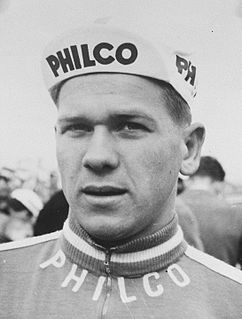Malvor–Bottecchia was an Italian professional cycling team that was active between 1978 and 1990.

Faema was a professional cycling team that existed from 1955 to 1962. The team's main sponsor was espresso machine manufacturer Faema.

Saint-Raphaël was a French professional cycling team that existed from 1954 to 1964. Its main sponsor was French apéritif brand Saint-Raphaël. From 1959 to 1961, a sister team existed, Rapha–Gitane–Dunlop.

Philco was an Italian professional cycling team that existed from 1960 to 1962.

Fagor was a French professional cycling team that existed from 1985 to 1989. Its main sponsor was Spanish domestic and commercial appliance manufacturer Fagor.
IJsboerke was a Belgian professional cycling team that existed from 1973 to 1982. Its main sponsor from 1973 to 1980 was Belgian ice cream manufacturer IJsboerke. In 1981 and 1982, its main sponsor was juice drink brand Capri Sun. Walter Godefroot won the 1978 Tour of Flanders with the team.

Gitane–Frigécrème was a French professional cycling team that existed from 1972 to 1973. At the end of the 1973 season, the team was merged into the Sonolor team, which was renamed Sonolor–Gitane for 1974. Its main sponsor was French bicycle manufacturer Gitane.

Liberia was a professional cycling team that existed from 1954 to 1962.
Cilo–Aufina was a Swiss professional cycling team that existed from 1978 to 1986. Its main sponsor was Swiss bicycle manufacturer Cilo.
Vermeer Thijs was a Belgian professional cycling team that existed from 1978 to 1982. It was the successor to the Maes Pils–Mini-Flat team.
Boston–Mavic was a Belgian professional cycling team that existed in 1980 and 1981. Its main sponsor was electrical goods manufacturer Boston.
Marc was a Belgian professional cycling team that existed from 1978 to 1980.
Canada Dry–Gazelle was a Dutch professional cycling team that existed in 1973 and 1974.

Magniflex was an Italian professional cycling team that existed from 1973 to 1981, and in 1986 and 1987. Its main sponsor was Italian mattress manufacturer Magniflex. The teams major victory was Pierino Gavazzi's win of the 1980 Milan–San Remo.
Werner was a Spanish professional cycling team that existed from 1969 to 1972. It participated in the 1971 Tour de France.
Van Cauter–Magniflex–de Gribaldy was a Belgian professional cycling team that existed in 1972. It was the successor of the Belgium team Hertekamp–Magniflex and the predecessor of the Italian team Magniflex. It participated in the 1972 Tour de France.

Maino was an Italian professional cycling team that existed from 1912 to 1936. Riders of the team won four editions of the Giro d'Italia. It was sponsored by Italian bicycle and motorcycle manufacturer Maino.
Gloria was an Italian professional cycling team that existed in part between 1927 and 1943. Its main sponsor was Italian bicycle manufacturer Gloria. Francesco Camusso won the general classification of the 1931 Giro d'Italia with the team.
The 1962 Critérium du Dauphiné Libéré was the 16th edition of the cycle race and was held from 28 May to 3 June 1962. The race started in Chamonix and finished at Grenoble. The race was won by Raymond Mastrotto of the Gitane–Leroux team.









